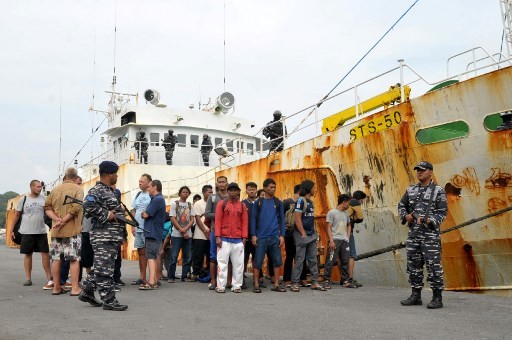Popular Reads
Top Results
Can't find what you're looking for?
View all search resultsPopular Reads
Top Results
Can't find what you're looking for?
View all search resultsIndonesian seafarers adrift in sea of exploitation, legal precarity
The recent deaths of four Indonesian seafarers have exposed the grim conditions that migrant workers face in the fisheries sector, largely because of a lack of legal protection.
Change text size
Gift Premium Articles
to Anyone
M
ost Indonesians were taught at school to be proud of their seafaring ancestors, but such pride has not translated into sufficient state protection. The livelihood remains among the most vulnerable to exploitation.
As the International Maritime Organization (IMO) prepares to celebrate the Day of the Seafarer on June 25, public sentiment in Indonesia is dominated by shock and outrage.
In recent months, a series of reports have emerged of Indonesian seafarers enduring poor working conditions aboard Chinese fishing vessels, including grueling hours and inhumane treatment.
Foreign Minister Retno Marsudi announced in May that four Indonesian sailors who had been registered to the Chinese fishing vessel Long Xin 629 had died.
The deaths of the four sailors, one of whom was buried at sea, exposed the grim conditions that Indonesian migrant workers face in the fisheries sector. Earlier this month, two Indonesians jumped off a Chinese vessel as it was underway in the Strait of Malacca. They were allegedly victims of human trafficking.
According to a report by Destructive Fishing Watch (DFW), at least 30 Indonesian crew members were victims of such violations aboard Chinese vessels between November 2019 and June of this year. Seven of those sailors reportedly died, three remain missing, and 20 have survived.
Anjar Prihantoro, deputy head of protection at the Agency for the Protection of Indonesian Migrant Workers (BP2MI), said that despite the wide media exposure over the past weeks, China ranks fourth among nations with the highest number of complaints from workers aboard fishing vessels.
Speaking at the launch of a policy brief by the Indonesia Ocean Justice Initiative (IOJI), Anjar said that the most complaints came from workers aboard vessels from Taiwan, South Korea and Peru, based on data collected from 2018 to May of this year.
“Almost half of the 411 complaints we received were about unpaid salaries, which means their companies weren’t bona fide,” he said. Other problems that were cited include deaths in the country of destination, work accidents, workers wishing to be discharged and manning agencies withholding legal documents.
The IOJI delivered several recommendations to improve governance, such as calling for the issuance of bylaws for the 2017 Migrant Worker Protection Law and the ratification of international conventions governing the protection of crew members aboard fishing vessels.
During the same discussion, Manpower Minister Ida Fauziyah said the modern slavery experienced by Indonesian seafarers was rooted in a flawed placement process.
She pointed out how the issuance of licenses for placement agencies was susceptible to abuse because of a lack of recruitment data collection, training and certification for prospective crew members. The monitoring process was also unenforced, she said.
“I met some of the workers who had come back from [South] Korea. Almost all of them lacked protections and skills and consequently received low salaries and worked at unlicensed agencies. These are a few examples out of the thousands of other cases. It was really striking,” Ida said.
She said the recent incidents had put pressure on the government to fast-track the implementing regulations for the 2017 law, particularly for protections aboard commercial vessels.
The 2017 Migrant Worker Protection Law is the legal umbrella for the protection of Indonesian migrant workers, including crew aboard foreign fishing vessels. The government missed the legally mandated deadline to issue the law’s implementing regulations in November of last year.
“At the moment, we have completed the draft regulation, and it has been submitted to the State Secretariat. We are also hoping that the government regulations will come out soon,” she said.
In the draft regulation, she said, it was hoped that the protection of fishing vessel crew members would be more comprehensive and include provisions governing pre- and postplacement protections in addition to the guarantees during the length of employment.
She said the forthcoming bylaw sought to tackle most of the unresolved issues, such as overlapping licenses, poor data collection and poor coordination among ministries and institutions. It also touched on the problem of low worker competencies and poor supervision.
“We absolutely must evaluate and take corrective steps to significantly minimize the problems they face at work,” the minister said.
Ida said she was discussing the overlapping licensing and related issues with the Transportation Ministry and the Maritime Affairs and Fisheries Ministry.
Indonesian Ambassador to Norway Todung Mulya Lubis said the government should establish a database on employers of migrant workers to facilitate assistance in the event of human rights and legal violations.
Todung said it would not be easy to improve governance because foreign fishing vessels often used “flags of convenience” and registered the vessel in a different country from that of the owner, complicating legal jurisdictions.
“The government needs to prepare a standard for contracts of employment for crew, for example by requiring a legal insurance clause for them,” he said.










